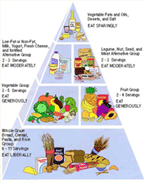Origins and evolution of the Western diet: health implications for the 21st century.

Title
Origins and evolution of the Western diet: health implications for the 21st century.
Source
American Journal of Clinical Nutrition. 81, (2): 341-354, 2005.
 There is growing awareness that the profound changes in the environment (e.g. in diet and other lifestyle conditions) that began with the introduction of agriculture and animal husbandry 10 000 yr ago occurred too recently on an evolutionary time scale for the human genome to adjust. In conjunction with this discordance between our ancient, genetically determined biology and the nutritional, cultural and activity patterns of contemporary Western populations, many of the so-called diseases of civilization have emerged. This review discusses the origins and evolution of the Western diet, and considers its health implications for the 21st century. Aspects considered include: evolutionary discordance; chronic disease incidence; hominin dietary characteristics; nutritional characteristics of pre- and postagricultural diets (dairy products, cereals, refined sugars, refined vegetable oils, alcohol, salt, fatty domestic meats); and health ramifications of foods in the neolithic and industrial eras (glycaemic load, fatty acid composition, macronutrient composition, micronutrient density, acid-base balance, Na-K ratio, fibre content).
There is growing awareness that the profound changes in the environment (e.g. in diet and other lifestyle conditions) that began with the introduction of agriculture and animal husbandry 10 000 yr ago occurred too recently on an evolutionary time scale for the human genome to adjust. In conjunction with this discordance between our ancient, genetically determined biology and the nutritional, cultural and activity patterns of contemporary Western populations, many of the so-called diseases of civilization have emerged. This review discusses the origins and evolution of the Western diet, and considers its health implications for the 21st century. Aspects considered include: evolutionary discordance; chronic disease incidence; hominin dietary characteristics; nutritional characteristics of pre- and postagricultural diets (dairy products, cereals, refined sugars, refined vegetable oils, alcohol, salt, fatty domestic meats); and health ramifications of foods in the neolithic and industrial eras (glycaemic load, fatty acid composition, macronutrient composition, micronutrient density, acid-base balance, Na-K ratio, fibre content).
In the United States and most Western countries, diet-related chronic diseases represent the single largest cause of morbidity and mortality. These diseases are epidemic in contemporary Westernized populations and typically afflict 50–65% of the adult population, yet they are rare or nonexistent in hunter-gatherers and other less Westernized people. Although both scientists and lay people alike may frequently identify a single dietary element as the cause of chronic disease (eg, saturated fat causes heart disease and salt causes high blood pressure), evidence gleaned over the past 3 decades now indicates that virtually all so-called diseases of civilization have multifactorial dietary elements that underlie their etiology, along with other environmental agents and genetic susceptibility. Coronary heart disease, for instance, does not arise simply from excessive saturated fat in the diet but rather from a complex interaction of multiple nutritional factors directly linked to the excessive consumption of novel Neolithic and Industrial era foods (dairy products, cereals, refined cereals, refined sugars, refined vegetable oils, fatty meats, salt, and combinations of these foods). These foods, in turn, adversely influence proximate nutritional factors, which universally underlie or exacerbate virtually all chronic diseases of civilization: 1) glycemic load, 2) fatty acid composition, 3) macronutrient composition, 4) micronutrient density, 5) acid-base balance, 6) sodium-potassium ratio, and 7) fiber content. However, the ultimate factor underlying diseases of civilization is the collision of our ancient genome with the new conditions of life in affluent nations, including the nutritional qualities of recently introduced foods.




0 Comments:
Post a Comment
<< Home